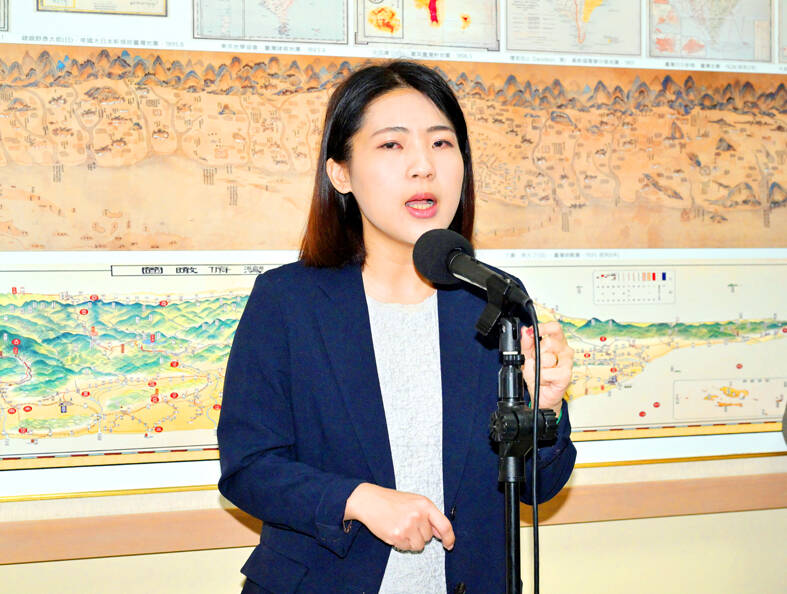Critics yesterday questioned Legislator Hsu Chiao-hsin (徐巧芯) about her sources of income after seeing a surge in her personal assets within a year, continuing what has been a week of accusations directed at the Chinese Nationalist Party (KMT) lawmaker.
Hsu and her husband, Liu Yen-li (劉彥澧), an official in the Taichung City Government, reported the couple’s combined assets at NT$4.58 million (US$140,871) at the end of 2022.
By the end of last year, it had doubled to NT$8.75 million, with the main increase being NT$4.15 million in bank deposits, Democratic Progressive Party (DPP) New Taipei City Councilor Lee Yu-hsiang (李宇翔) said.

Photo: Tien Yu-hua, Taipei Times
“Where did the extra income come from? We ask Hsu to explain to the public how you and your husband accumulated so much cash in just a year,” Lee said.
Hsu at the time was a Taipei city councilor and Liu was a bureaucrat with annual salaries of NT$2.2 million and NT$2 million respectively, he said.
Lee demanded that Hsu resign, referring to past occasions in which Hsu asked DPP officials and legislators to resign over financial scandals.
Hsu’s personal assets and income sources came under scrutiny after her sister-in-law, Liu Hsiang-chieh (劉向婕), and her husband, Tu Ping-cheng (杜秉澄), were detained on money laundering charges involving an alleged scam operation.
Investigators said that Liu Hsiang-chieh helped to launder NT$27 million for a scam ring, while Hsu said she had given NT$1 million to her mother-in-law during that time.
Hsu at first said it was a loan for interest payments, then later said it was a gift to her mother-in-law.
Hsu is also facing litigation filed by the Taiwan Statebuilding Party this week, which demanded she take leave immediately pending a judicial investigation into the case involving her sister-in-law.
“Hsu did not explain clearly about the NT$1 million she gave to her mother-in-law,” said Taiwan Statebuilding Party Kaohsiung City Chapter director Yang Pei-hua (楊佩樺), who filed a judicial complaint against Hsu accusing her of corruption and fraud.
Hsu said she was not involved in the scam operation, but rather is a victim in the case by association.
She said the NT$1 million was for her mother-in-law, who borrowed money to help Tu Ping-cheng start a company in 2021.
The NT$1 million was to help pay off the bank interest, she added.
Separately, political pundit Wen Lang-tung (溫朗東) said he is to next week file a defamation case against Hsu for NT$1.5 million, after Hsu accused Wen of being discharged from compulsory military service for “play-acting” like a person with a severe mental disorder by eating grass, defecating on his bunk and other behavior.
“I am not an elected representative or a government official, so Hsu’s talk has violated the Personal Data Protection Act (個人資料保護法),” Wen said.

Taiwan has received more than US$70 million in royalties as of the end of last year from developing the F-16V jet as countries worldwide purchase or upgrade to this popular model, government and military officials said on Saturday. Taiwan funded the development of the F-16V jet and ended up the sole investor as other countries withdrew from the program. Now the F-16V is increasingly popular and countries must pay Taiwan a percentage in royalties when they purchase new F-16V aircraft or upgrade older F-16 models. The next five years are expected to be the peak for these royalties, with Taiwan potentially earning

STAY IN YOUR LANE: As the US and Israel attack Iran, the ministry has warned China not to overstep by including Taiwanese citizens in its evacuation orders The Ministry of Foreign Affairs (MOFA) yesterday rebuked a statement by China’s embassy in Israel that it would evacuate Taiwanese holders of Chinese travel documents from Israel amid the latter’s escalating conflict with Iran. Tensions have risen across the Middle East in the wake of US and Israeli airstrikes on Iran beginning Saturday. China subsequently issued an evacuation notice for its citizens. In a news release, the Chinese embassy in Israel said holders of “Taiwan compatriot permits (台胞證)” issued to Taiwanese nationals by Chinese authorities for travel to China — could register for evacuation to Egypt. In Taipei, the ministry yesterday said Taiwan

Taiwan is awaiting official notification from the US regarding the status of the Agreement on Reciprocal Trade (ART) after the US Supreme Court ruled US President Donald Trump's global tariffs unconstitutional. Speaking to reporters before a legislative hearing today, Premier Cho Jung-tai (卓榮泰) said that Taiwan's negotiation team remains focused on ensuring that the bilateral trade deal remains intact despite the legal challenge to Trump's tariff policy. "The US has pledged to notify its trade partners once the subsequent administrative and legal processes are finalized, and that certainly includes Taiwan," Cho said when asked about opposition parties’ doubts that the ART was

If China chose to invade Taiwan tomorrow, it would only have to sever three undersea fiber-optic cable clusters to cause a data blackout, Jason Hsu (許毓仁), a senior fellow at the Hudson Institute and former Chinese Nationalist Party (KMT) legislator, told a US security panel yesterday. In a Taiwan contingency, cable disruption would be one of the earliest preinvasion actions and the signal that escalation had begun, he said, adding that Taiwan’s current cable repair capabilities are insufficient. The US-China Economic and Security Review Commission (USCC) yesterday held a hearing on US-China Competition Under the Sea, with Hsu speaking on